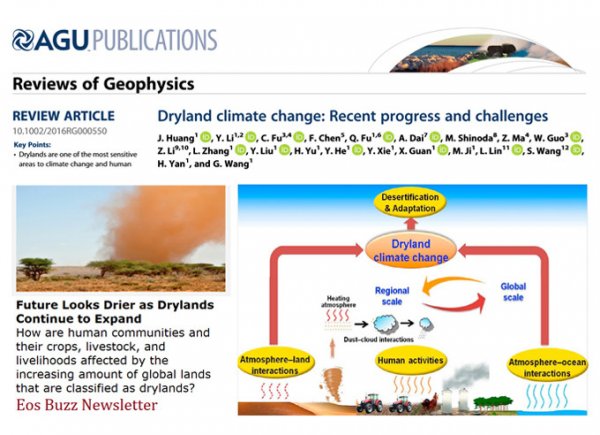
Lately, Reviews of Geophysics (IF=12.34), the most influential annual review on geosciences, published review paper titling “Dryland climate change: recent progress and challenges” created by Prof. Huang Jianping from College of Atmospheric Sciences, LZU (as the first author), Academician Fu Zongbin (as the corresponding author) and other 19 authors. The paper reviewed the recent progress and challenges of arid and semi-arid climate research.
The abstract of the paper as follows:
Drylands are home to more than 38% of the world's population and are one of the most sensitive areas to climate change and human activities. This review describes recent progress in dryland climate change research. Recent findings indicate that the long-term trend of the aridity index (AI) is mainly attributable to increased greenhouse gas emissions, while anthropogenic aerosols exert small effects but alter its attributions. Atmosphere-land interactions determine the intensity of regional response. The largest warming during the last 100 years was observed over drylands and accounted for more than half of the continental warming. The global pattern and interdecadal variability of aridity changes are modulated by oceanic oscillations. The different phases of those oceanic oscillations induce significant changes in land-sea and north-south thermal contrasts, which affect the intensity of the westerlies and planetary waves and the blocking frequency, thereby altering global changes in temperature and precipitation. During 1948–2008, the drylands in the Americas became wetter due to enhanced westerlies, whereas the drylands in the Eastern Hemisphere became drier because of the weakened East Asian summer monsoon. Drylands as defined by the AI have expanded over the last 60 years and are projected to expand in the 21st century. The largest expansion of drylands has occurred in semiarid regions since the early 1960s. Dryland expansion will lead to reduced carbon sequestration and enhanced regional warming. The increasing aridity, enhanced warming, and rapidly growing population will exacerbate the risk of land degradation and desertification in the near future in developing countries.
Reviews of Geophysics, started in 1963, is an annul review academic magazine co-held by American Geophysical Union. As only accepting appointed articles, it publishes merely about 20 papers on solid geophysics, cryosphere science, atmospheric sciences, marine science, space physics, etc.
The chief editor of Review of Geophysics posted an article(the website address: https://eos.org/editors-vox/future-looks-drier-as-drylands-continue-to-expand)on Eos Editors’ Vox (Eos:Earth and space science, news express journal on earth and space sciences) and Eos Buzz Newsletter to recommend this paper.
(Translated by Li Qi, proofread by Zhang Lu)




